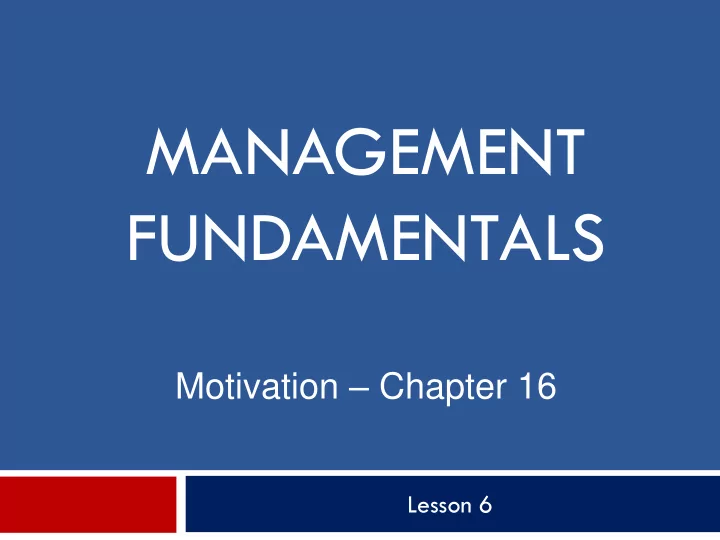

MANAGEMENT FUNDAMENTALS Motivation – Chapter 16 Lesson 6
If you are motivated….you will be a More productive Happier Healthier
Page 526 Motivation is a psychological force which can arouse a person’s enthusiasm Effort Complete task Complete + Effort Enthusiasm task
A Simple Model of Motivation Unfulfilled needs (desires) are the origin of motivation Unfulfilled Psychological Tension motivational Needs force Sigmund Freud “Unconscious needs such as sexuality is the heart of human motivation”
Motivational triggers Motivation Motivation due Self-motivation to external triggers
Question: What benefits an organization can get by motivating its employees?
Practically, what would be the actual relationship in between motivation and employee performance?
Theories related to Motivation
Theories of Motivation Hierarchy of Needs Theory Two factor Theory Expectancy Theory Goal Setting Theory Note: ERG theory, Equity Theory Self-reading
Page 530 Maslow’s Hierarchy of Needs Humans have 5 types of needs • Physiological needs • Safety needs • Social needs (Belongingness Needs) • Esteem needs • Self-actualization The needs will be satisfied in a hierarchical order As per the order of fulfillment Abraham Maslow
Page 530 Maslow’s Hierarchy of Needs
Page 532 Two Factor Theory ( By Fedrick Hertzberg - 1959) Herzberg’s theory was based on a work study. He believed that job satisfaction can increase motivation 200 engineers/accounts were interviewed Two questions were asked Q1 - What factors can improve your job satisfaction? Motivating Factors Q2 - What factors reduce job satisfaction? Hygiene Factors
Page 532 Herzberg’s Two -Factor Theory
Theory X and Theory Y (Douglas McGregor) Theory X Assumes that employees dislike work, lack ambition, avoid responsibility, and must be directed and coerced to perform. Theory Y Assumes that employees like work, seek responsibility, are capable of making decisions, and exercise self- direction and self-control when committed to a goal.
Expectancy Theory
Page 539 Expectancy Theory in Motivation If employees are given rewards for their good performance they could be motivated to perform better Victor Vroom E.g. ‘Work hard” Achieve targets ‘Rewarded as the best salesman’ Effort Performance Reward
Expectancy Theory contd. Vroom suggested that there are 2 mental conditions (cognitive factors) which direct the motivated behaviour (effort) of a person in this context. They are Victor Vroom – Valence – Expectancy
a. Valence Is the reward valuable? This refers to the preference (likeability) of a particular reward. If the reward has some value to a person it will be a positive valence else indifferent or negative E.g. ‘Work hard” Achieve targets ‘Become the best employee’ Effort Performance Reward (outcome)
E P Expectancy - Will the effort lead to the expected performance? ‘Work hard” Achieve monthly targets Effort Performance Can I achieve targets by working hard? Belief that an effort leads to a particular performance This magnitude of belief will depend on a person’s knowledge, experience, beliefs, available information, assistance possible to obtain, etc.
P R Expectancy – will the performance really lead to a reward? The belief that a person will actually receive a reward for his or her performance E.g. ‘Work hard” ‘A chieve targets ’ ‘Best Employee’ Effort Performance Reward
Expectancy Theory Victor Vroom
Additional Slides
Equity Theory Equity = Output (Reward) Input (Effort) Equity Theory Individuals compare their job inputs and outcomes with those of others and then respond to eliminate any inequities.
Simple Example Alwis Silva Working hours 100hrs 100hrs Salary Salary 30,000/- 60,000/- package Rs. 30000/100 60000/100 Equity Rs. 300 ph Rs. 600 ph Reduced productive working Change No change hours 50 hrs New equity = 30000/50 = Equity remains Rs. 600ph Rs. 600 ph
Equity Theory (cont’d) Choices for dealing with inequity: Change inputs Change outcomes (increase output) Distort/change perceptions of self Distort/change perceptions of others Choose a different referent person Leave the field (quit the job)
Equity Theory (cont’d) Distributive Justice Perceived fairness of the amount and allocation of rewards among individuals . Procedural Justice The perceived fairness of the process to determine the distribution of rewards.
Job Design for Motivation Job Simplification Job Rotation Job Enlargement Job Enrichment
Recommend
More recommend